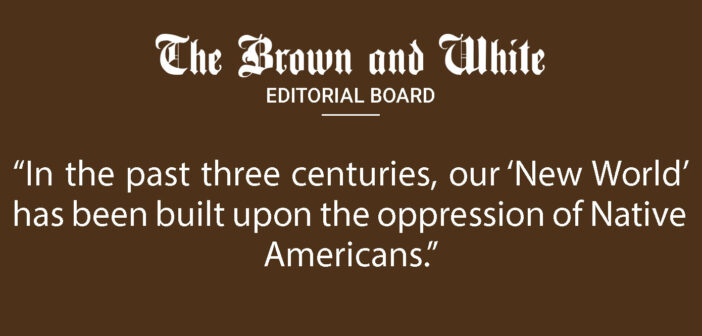As November commences, our eyes begin to glance toward Thanksgiving and Thanksgiving break. The national holiday is characteristic for the month as a whole – something to look forward to.
Not-so coincidentally, November is also Native American Heritage Month – a month dedicated to celebrating the histories, cultures and traditions of Native Americans.
As many of us were taught in elementary school and beyond, the story of the first-ever Thanksgiving sounded a little something like this: “The pilgrims settled into the ‘New World,’ specifically in Plymouth, Massachusetts. They encountered the Wampanoag Native Americans and had a friendly exchange. In the end, the pilgrims and the Wampanoag tribe gathered and celebrated this settlement with a big feast. And they lived happily ever after!”
That’s what we were taught – that it was all peace and kindness. Our educational agendas left out all that involved colonization. English settlers threatened, killed and abused the Native Americans to build a “New World” that was already their own.
We reside on stolen land after colonizers – many of whom could potentially be our ancestors – took advantage of the indigenous people and claimed this land as our own.
Today, Thanksgiving could be considered just a general holiday dedicated to being grateful for what we have and gathering with loved ones.
However, with its dark origins and its lasting impact on indigenous peoples, it’s crucial that Native Americans are simultaneously respected and recognized.
As a result of colonialism and oppression, indigenous people lost their land. Yet, the loss of owned land holds more significance.
Loss of land means forced migration and dispersal. It’s a loss of gathering which caused the erasure of Native American tribes’ rich cultures and languages— many of the effects still being felt today.
The damage done over the past three centuries has generated lasting effects on the indigenous people who are still here. In the past three centuries, our “New World” has been built upon the oppression of Native Americans.
Over 4,000 indigenous people died in residential schools, and the number is still climbing today as they find bodies. Residential schools were boarding schools and their slogan “Kill the Indian, save the man,” meant they were going to take your culture out of you.
There are immense gaps in health, education and social-economic status because of the mistreatment indigenous people have experienced for years.
While it’s important to designate a month to Native Americans and their culture, the damage done to them and their culture is still unrepaired – especially considering the fact that our schools still present a false narrative of history.
How could we even begin to uplift Native American heritage without first properly acknowledging the historical damage? We can’t initiate action to mend this grave harm when the truth of their history is blatantly ignored.
On that note, here’s a brief history of Native Americans in the Lehigh Valley:
For over 10,000 years, the Lehigh Valley was a small part of the extensive Lenni-Lenape territory. However, in 1737, William Penn and his two sons took over this land, notoriously known as “The Walking Purchase.”
Through this purchase, the Lenape were cheated out of over one million square miles of land – including the Pennsylvania counties of Lehigh, Northampton, Bucks, Carbon, Schuylkill, Monroe and Pike.
The Lenape were forced to disperse out of their land—what is now known as the Lehigh Valley.
Given this piece of history, our own university may have been built on what once was Lenape land. Right on the edge of campus, the Lehigh River is named after the Lenape name for the river, “Lechewuekink.”
Universities and other institutions across the country have formulated “land acknowledgments” – statements publicizing the indigenous history that each institution is built upon, a step toward respecting indigenous people and their connection to the land.
For instance, Princeton released a land acknowledgment for the Lenape.
With no land acknowledgment of our own, we only wonder if Lehigh was built upon Lenape land. The odds are high that this land is not ours, yet we’re still left clueless about the history.
Merely recognizing indigenous people, alongside their culture and impact on our nation, doesn’t take away the damage that’s been done for generations. Yet, raising awareness is the essential start to change.
In order to take action and uplift indigenous people, we must educate ourselves with the fact that they’ve been oppressed and actively harmed through stolen land and lives.
We can’t start action or conversation without properly acknowledging the history.






Comment policy
Comments posted to The Brown and White website are reviewed by a moderator before being approved. Incendiary speech or harassing language, including comments targeted at individuals, may be deemed unacceptable and not published. Spam and other soliciting will also be declined.
The Brown and White also reserves the right to not publish entirely anonymous comments.
11 Comments
Acknowledging history is fine but attempting to hold current generations accountable is unacceptable.
I am part Lenape but attended Lehigh & held no grudge nor fostered any anger toward my fellow students who were 100% white. Nor did I want to be part of creating divisiveness thru any type of critical race theory training of our children or grandchildren.
One can only be responsible for their own behavior & attempting to create bias & anger among people today for prior generation evolutionary events is wrong.
Thanks for your perspective as a member of an aggrieved group.
I am conflicted. Should I beg for pardon and make reparations to those who abused Native Americans in the past or should I emigrate to the old country and seek reparations from those who abused my ancestors.
I can’t claim membership in the SAR or DAR, missing it by at more than a few generations. I suppose many Lehigh students, but far fewer than when I was a student, are candidates for massive guilt as a result of greedy, unjust, etc actions by their ancestors. Had I not been an Engineering student, I may have learned more about the injustices perpetrated by the gentry and great unwashed and their causes. I did take PA history in high school so I heard about the “Walking Purchase”, had they known, Kenyans would have been imported for the walk. PA history included crooks in office and election hi-jinks when stolen elections were a reality. Those and many other thing were wrong but I don’t have guilt for them.
Lets face it, it is human nature to take advantage of those who can be taken advantage of. The pilgrims were one of those groups. Instead of learning to disdain abuse they learned to use it as a tool. The abuse continues. Become a better you and it should rub off on others.
Guilt and hand wringing are not helpful. Treating others with respect and compassion is a better response. Do at least one thing every day to make someone smile and increase the numbers. If you wish donate to a Native American charity this Thanksgiving and pray for it’s success.
On Thanksgiving be glad that even as messed up as many Americans of former times were they still managed to accomplish much that was good. Progress provides partial solutions to some problems and creates more of them.
Bravo. Now let us know what you personally will be sacrificing and handing over to “marginalized” communities.
Obviously, the Brown and White editors need to pack up and leave North America.
It really seems to me, this isn’t an institution of high education, but simply a propaganda mill for an illiberal ideology,
The singular focus only on what white people did with no context of how native tribes also allied with different European Governments to make war on rival native tribes and gain advantage, as well as the tribes massacring white settlements, shows that this isn’t about history, but about thinly veiled bigotry directed at European settlers. You can find just as many atrocities, to include genocides, of tribe against tribe warfare as you can amongst settler vs tribe conflicts if you care to look. Do you ever write articles denouncing those? If not, you should look at yourself about why and not make simplistic settler=oppressor/tribes=victim constructs that reduce a very complicated history down to “I’m good, you’re bad”.
“That’s what we were taught – that it was all peace and kindness.”
This is a lie. The history of the European settlement of the Americas has ALWAYS been taught as a violent history. What’s not taught is that this time in the Americas was no more violent than what was going on before European settlement.
“English settlers threatened, killed and abused the Native Americans to build a “New World” that was already their own.”
The Amerindians waged constant warfare over land for thousands of years before Europeans showed up. Europeans settled these conflicts with finality.
“We reside on stolen land after colonizers”
No more so than anyone else in these lands throughout history.
“with its dark origins and its lasting impact on indigenous peoples”
There are more Amerindians today than at any other time in history and they are wealthier and healthier than Amerindians at any other time in history.
“our “New World” has been built upon the oppression of Native Americans.”
Incorrect. For the past four centuries the New World has been built on the blood, sweat, and tears of European settlers who came with the creative energy to build the modern world, a creative energy all other people’s in the Americas lacked.
“There are immense gaps in health, education and social-economic status” because of the creative energies of the Amerindians. This should be no surprise, since during the time Europeans were laying the political, moral, and technical foundations of our unimaginably wealthy and peaceful modern world, the Amerindians were a violent stone aged people with no progress beyond this point.
“How could we even begin to uplift Native American heritage without first properly acknowledging” what the Amerindians were and had done for thousands of years before Europeans ever set foot on the American continents?
In short, this piece is nothing but a hate-filled racist screed against Europeans, with no acknowledgement of any actual history of the Amerindians.
When I read thought-provoking editorials like this one about Thanksgiving, I am left with the question, would Native American peoples have lived in the state that Northern European settlers found them if the Northern Europeans had never come? Or, most probably, it would just have been some other group? Perhaps the Spanish, maybe the Japanese or Chinese? It could even have been the North African Muslims.
Either way, the fate of the indigenous people living in North America would not survive old-world migrants. I do not say that with pride or resignation. Life on planet earth is nothing if not a state of change. Tragically, the Colombian exchange was devastating to the natives; it was, however, likely unavoidable.
To the extent possible, we would all be served to avoid the current cause dejure of presentism. That is the application of current thoughts, norms, and morals to historical action. We are all limited by our experience and understanding of the time in which we act and live.
That is not to laud or otherwise celebrate cruelty, brutality, or any other inhumane actions. It does mean that we view our forbearers critically, understand that they did ‘good’ and ‘bad’ with the harshest criticism held out for those who acted poorly by the standards of their time.
Failure to do this leaves us susceptible to making mistakes equally egregious that will be picked apart by future generations.
But not a single one of you or your families will be giving the land back will you?
Honestly, we don’t even know who the first natives were. Science, which we should trust regarding covid, has determined through DNA that people, who were NOT NATIVES, came to N. America from different places at different times. That means we have NO IDEA who the real “1st people” were and it’s irrelevant anyway because whoever they were they migrated here just like we did. They also killed each other and warred with each other,
Indians are freaking lucky they weren’t wiped out and were given land at all. That was not the norm throughout history. Historically they’d be killed or enslaved.